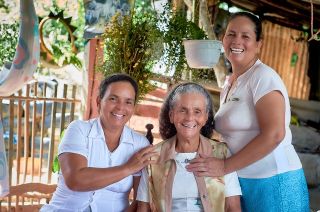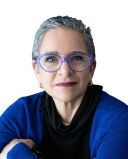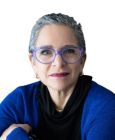Parenting
Pearls From 101 Parent Years
Personal Perspective: Here are tips from a mother of four.
Posted April 24, 2024 Reviewed by Ray Parker
Key points
- Parenting can be hard no matter what, but no one knows your child(ren) like you do.
- Taking care of yourself is a skill that makes you a better parent.
- Don't expect to be perfect as a parent—no one is.

My kids, aged 33, 30, 20, and 18, add up to 101. That, plus a career helping parents navigate raising their own kids, and I’ve learned a few things. (I’ve made plenty of mistakes, too—just ask my kids.) By way of true stories and timeless mom quotes, here are a handful of pearls from pregnancy to post-launching:
Just Do It, but Make Sure You Do It Your Way
Bulging at the seams with my second child, I waddled into my grandmother’s house. “What will you name this one?” she asked, loving but definitely entitled to know.
“For a girl,” I started, “we’re thinking Rivkah.” It sounded lyrical and meant Rebecca in Hebrew to me, a strong and determined matriarch. It reminded my then-husband of his love for rivers and all things riparian, and he agreed.
“That’s awful,” Gramma spat fiercely, a spry, shrinking-below-her-younger-five-foot stature, 83-year-old. "Just terrible. You can’t do that.”
I knew I’d done nothing wrong. I was 33 and couldn’t remember her angry since preschool. Stunned, I stayed mute.
“How could you even think of naming a child Rivkah,” she railed, disdain dripping from her words. “You just can’t!”
It turns out that in the small Utah town where Gramma grew up, there was one sex worker, and her name was—you guessed it—Rivkah. My grandmother and her sister Sadie paid Rivkah secret visits and appreciated her kindness. She offered them coins every time they climbed the stairs to her apartment. But these visits were forbidden and surreptitious. The name’s stigma stuck.
In time, Gramma and Aunt Sadie grew to accept “Rivi” for short. They didn’t have a choice; it was her name, and she was so cute that nothing could keep them from wanting to “eat her up” and love her in every way.
Pearl: All kinds of people, some you barely know, feel entitled to regale you with tons of parenting advice from the moment you are pregnant or parenting. But they don’t know you or your child like you do and never will. Sure, listen if you like, tell them you’ll think about it, smile and nod. But don’t let them undermine your confidence. Do whatever you think is best. (If it turns out not to be best, you can always try something else—that’s a parent’s prerogative.) Own what you know.
It Bears Repeating: Self-Care Isn’t Selfish
_0.jpeg.jpg?itok=VBcV-Su7)
I had a dental check recently with a hygienist I’ve known since before her pregnancies with now-teens. Between plaque-scaling, cleansing, and flossing, we spoke about mothering, family-ing, and holding jobs in healthcare.
“I take care of people all day,” she paused, sweeping her free hand across the office, “and then I go home and take care of people all night.”
She paused, pensive. “Whoever takes care of me?” she asked. “There’s something really wrong here—as a little girl, I had princess fantasies. That’s definitely not what’s happening.”
Pearl: The most common myth I disabused mothers of in therapy was that making time for themselves was selfish; they believed they should always prioritize their kids', spouses', or relatives’ needs above their own. It’s simply not true. “You can’t drink from an empty well” is a popular quote explaining why. Or my favorite, from Chinese medicine: “Feed the mother to feed the child.”
A depleted, exhausted mother cannot do her best for her children or anyone else. Research supports this, showing that worn out, depressed, negative mothers who access treatment and recover have children who suddenly become healthier and happier as well (1). It’s not fair, but it’s true: a family’s mood revolves around a mother’s.
So whatever it takes: from girls’ night to a yoga retreat; taking a photography class or going to therapy; taking meds, starting exercise, or just time away to walk or shop or do something else reviving, find a way for regular (consistency is key) self-care if you can. It’s not selfish; it's better for everyone.
We’ve All Experienced Trauma and Will Sadly Pass It On, Don’t Beat Yourself Up
I recently asked a yoga teacher about her mother; I know they’re close. “My mom’s big joke,” she smiled, “is that I raised her. Both my parents were 17 when I was born.”
Therapy thoughts sparked and kaleidoscoped in my head: “She’s so well adjusted. How did her parents do it? They must have had a lot of family support to pull teen parenting off. There has to have been some childhood trauma/dysfunction/adverse experiences she suffered. I never considered that; I wonder what happened to her?” I was impressed. She is a good parent herself, and I knew this must have taken a lot of work on her part.
Pearl: Parents often joke about, or console themselves with, the “therapy fund” their kids will need because of parental screw-ups. Well, it’s true. We all mess up parenting, some admittedly more than others, but none of us are perfect parents. My family of origin was dysfunctional in subtle and not-so-subtle ways that impacted me, like all families, and my dysfunction impacted my children.
We can’t change the past and only waste time feeling guilty or ashamed. We can accept what we did and accept ourselves as fallible, flawed, ever-striving human beings. That’s the beauty of parenting: As long as we’re alive, we get a chance to improve. Talk to kids about mistakes, take responsibility, apologize, try again, and help them (and us) heal.
We don’t help by telling them how terrible we feel or asking them to absolve our guilt. That’s not their job. We can, however, learn to repair, trying forever better. That is our job: to fix it when we fail or at least try. Over and over again.
Nothing Lasts Forever Except Parenting, But
My mother also had four children. She visited the day after I birthed my last. Sitting on the couch with my infant asleep at the breast, I looked at her, sudden terror in my eyes.
“What’s wrong?” she asked, alarmed.
“I just realized,” I told her, gripped inside an epiphany that it was a bit late. "This parenting thing doesn’t end when they’re 18, does it?” My life unfurled in my mind, an endless slog of mothering minutiae, parent meetings, crises averted (and confronted), birthday parties, phone calls, emails, and anxiety, all interrupting the rest of my days. Endless, relentless.
As a friend quoted her mother, “They may be out of the nest, but you’ll forever be a bird watcher.” Yep. There were hellish moments and all, for sure. But on balance, gratefully so.
Pearl: It’s not so bad. That is when we finally accept that once they’re adults, we really have no control. We need to let go, for them and for us. They’re unaware of how smart we are and what wisdom we’ve garnered that could solve all their problems. They can’t see we’re much more qualified than they are to tell them what to do.
They can’t, don’t, and won’t (generally) abide. And they shouldn’t. They are the experts on them. This awareness offered one of those moments (see above) when I had to take responsibility and apologize. I realized my children deserved autonomy over their lives and didn’t want or need (how could that be?) unsolicited input from me—not more than I had at their age.
The best news? Letting go of telling them what to do transformed my relationships with my children. I nod and smile, sucking my lips in, securely shut. “I’m sure you’ll figure it out,” I say, or, “I know you’ll make the right decision.” I try not to offer opinions unless they ask. And magically, when I stopped telling them what to do, suddenly they asked. A lot more.
You enjoy bird watching as they become adults. Prepare to be amazed. From afar.
References
Weissman MM, Wickramaratne P, Pilowsky DJ, Poh E, Batten LA, Hernandez M, et al. Treatment of maternal depression in a medication clinical trial and its effect on children. American Journal of Psychiatry. 2015 May 1;172(5):450–9.




